Features
Comments on overseas news

Cassandra’s title this Friday indicates her continuing hopelessness (and yes, most certainly, disgust) with matters Sri Lankan. What pertains in this fair isle sent willfully to darkness and misery through greed and bad management? Her usual caustic Friday comments are on this land of ours and trouble with an occasional ray of hope. Today, she has nothing to write about Siri Lanka. A stubborn Prez, who makes no move to speak with trade unions et al; professionals including doctors and university lecturers striking and protesting; few trains running, many branches of banks closed, and the police rampantly tear-gassing and water-cannoning and surreptitiously manhandling protesters, and the Ordinaries suffering. That’s how the land is now. Tiny shining silver linings are mercifully glimmering dimly: the rupee temporarily appreciated against the US dollar and thus against other currencies; tourism has brought in more money and the sun shines bright and the rains come when needed. This, while countries have been rampaged by storms and earthquakes. Over here Nature is kind but Man is vile: mostly the men at the top.
greed and bad management? Her usual caustic Friday comments are on this land of ours and trouble with an occasional ray of hope. Today, she has nothing to write about Siri Lanka. A stubborn Prez, who makes no move to speak with trade unions et al; professionals including doctors and university lecturers striking and protesting; few trains running, many branches of banks closed, and the police rampantly tear-gassing and water-cannoning and surreptitiously manhandling protesters, and the Ordinaries suffering. That’s how the land is now. Tiny shining silver linings are mercifully glimmering dimly: the rupee temporarily appreciated against the US dollar and thus against other currencies; tourism has brought in more money and the sun shines bright and the rains come when needed. This, while countries have been rampaged by storms and earthquakes. Over here Nature is kind but Man is vile: mostly the men at the top.
The worst we, the public. have to bear is pontification by State Ministers. We heard a chappie who fell off the balcony of a hotel in a far-off land saying the health service is going on OK. This verbal assurance against TV pictures of greatly suffering sick humans gathering in closed doored hospitals and unattended outpatients’ clinics. We were not given explanations though public funds from over here went to pay his hospital bills down under, and we still wonder what urge drove him to circus crawl along the outer ledge of the hotel he was in.
Then loud and clear come speeches by a man who was quite poor when he entered Parliament but within a few years of being MP and Minister could fork out millions, it was said, as alimony to get rid of his lawful wedded in favour of another. The worst is when a supposedly former chain snatcher rumoured to have operated in a certain coastal railway station, is now one of the major defending pontificators for a fast fading bud political party. How sanctimonious he sounds; looks however betray him.
Diana Gamage’s voice advocating fun and games based on gambling and licensing of ganja has been silent, or silenced. Geetha Kum, whom we hardly listen to, has come out with a good proposition – to start an office or whatever where unwanted infants can be handed over to. Abandoning of tiny babies, a heinous unthinkable crime and if thought of producing shivers of horror, is practiced in this so-called Paradise. Recently, a couple left an infant in a train toilet. At least leave the baby on a seat instead of closeting it to probably die in a toilet. Unusual since the man too was with the woman when the baby was abandoned. Usually, it’s an unmarried woman who gives birth to an unwanted infant who does the deserting, evoking a streak of pity in our minds. What else could she do, we attempt saying in justification, which justification is NOT possible. There is no excuse possible for such a crime. Why ever should the baby pay for the mother’s sin? But maybe the baby gets a better chance in life than remaining with the woman who brought it to the world.
Commonwealth Day
I was alerted to this day, celebrated on Monday March 13, by a circular epistle that arrived in Cass’ in-box from no less a person than Dr Anne T Gallagher AO, Director General/ Commonwealth Foundation. What earned Cass this signal honour though of course thousands of letters would have been sent out? She once submitted a short story for the Commonwealth short story competition, so her name was registered as so many others from Sri Lanka would be. I quote from the letter:
“This year marks the tenth anniversary of the signing of the Commonwealth Charter: a document that sets out, in clear terms, what the Commonwealth means and what it stands for,
That shared vision – and those shared values – can help us move towards a better and fairer world.” Sent was a video clip where a dark-skinned woman ‘speaks’ in sign language while the words appear below. Advocated are Democracy; HR; Intl. Peace and Security; Tolerance and Respect; Freedom of expression; Separation of powers; Rule of Law; Good governance; Sustainable development; Protecting the environment; Access to health; Education, Food and Shelter; Gender equality; Importance of young people in the community; Role of civil society.
The last para in the letter ran thus: “It is by respecting and protecting those values that we – the Commonwealth’s 2.5 billion citizens – can help shape a different future for our communities, our countries and our planet.”
If you study that list, we in Sri Lanka are sorely in need of most of them, though we are supposed to be a democratic country. If only our leaders have these, or at least some in mind, and work towards implementing and improving their status in the island, we could progress.
Commonwealth Day in March each year marks the beginning of a week-long series of events and activities happening around the globe, including religious and civil gatherings, debates, school assemblies, flag raising ceremonies and cultural events. This March 13, at the Westminster Abbey Celebration Roshini Abbey and Nuwan Hugh Perera sang beautifully and in perfect harmony a song in Sinhala with title Anagathaya – Future.
The Commonwealth Charter makes for interesting reading emphasising the fact it is a voluntary association of independent and equal sovereign states, each responsible for its own position … a force for good and an effective network for co-operation and for promoting development. It confirms that the special strength of the Commonwealth lies in the combination of the diversity of the 56 countries in it. Associated with reading and viewing videos on the 10th C Day, one remembers the Queen who was so concerned, committed and proud to be Head of the Commonwealth. We recall the CHOGM – Commonwealth Heads of Government biennial meeting – hosted in 2013 by Sri Lanka when Mahinda Rajapaksa was President and Prince Charles represented the Queen.
AUKUS
Another combination of countries, much more recent, much smaller with only three countries involved and having the stated purpose of being a trilateral security pact was announced on September 15, 2021, between Australia, the UK and US for the Indo Pacific region. Its most recent meeting was in San Diego with PM Anthony Albanese, President Biden and PM Rishi Sunak attending. The main topic of the meeting was arming Australia with a nuclear submarine. Necessary we suppose with China and Russia getting more powerful and belligerent too.
Watching a video and listening to the three leaders’ speeches, Cass cried out loud and clear: “Oh for a Rishi Sunak for Sri Lanka!” We had much trust in and expectations from Ranil Wickremesinghe though he had lost his parliamentary seat in the last general election and also almost annihilated the old party with the elephant symbol. Cass remembers seeing a video of him in the White House between 2001 and 2009 when George W Bush was Prez and for sure seeing Ranil W smarter, more personable and generally outshining the supposedly greatest leader of the world. Ranil has disappointed us wholesale. Too much Rajapaksas in him now.
And, so, Cassandra closes her conversation in a most fearful state of expecting longer strikes, total chaos in the country because of a lack of communication between reps of the various groups of citizens of the country with its leader.
Features
Leadership, Ethics & Non-compromise – I

Navigating the Winds of Change:
(Keynote address delivered at the first Award Ceremony of the ‘The Bandaranaike Academy for Leadership & Public Policy on 15 February 2025 at Mihilama Medura, BMICH, Colombo)
I have been made to understand, today marks the awards ceremony of the first cohort of students at the ‘The Bandaranaike Academy for Leadership & Public Policy.’ So, it is a happy day for all those graduating in a world where immediate work and life circumstances are not generally marked by happiness.
 I apologize for starting on a seemingly morose note, but we are in more dire straits – as a nation and as citizens – than we have ever been since Independence. And much of this unhappiness stems directly from decisions taken by people we have considered leaders. In many cases, we have also elected them – repeatedly. But I am not talking only of public leaders who are often visible, but also of people away from the public eye, in leadership positions, such as in public and business organizations, kin networks, schools and formal and informal groups, who also take decisions that affect others – and often in life-changing ways.
I apologize for starting on a seemingly morose note, but we are in more dire straits – as a nation and as citizens – than we have ever been since Independence. And much of this unhappiness stems directly from decisions taken by people we have considered leaders. In many cases, we have also elected them – repeatedly. But I am not talking only of public leaders who are often visible, but also of people away from the public eye, in leadership positions, such as in public and business organizations, kin networks, schools and formal and informal groups, who also take decisions that affect others – and often in life-changing ways.
The founders of this academy must certainly have had a sense that local and global structures of leadership are in relative disarray when they decided that the vision of the academy is to ‘create the next generation of ethical, effective and socially responsible leaders.’ From my vantage point, I would summarize these expectations in three words: Leadership, Ethics & Non-compromise’. These are the ideas I want to talk about today against the backdrop of our country’s vastly transformed political landscape and societal mood.
Let me lay it out there: leadership and its congruent qualities, such as ethics and non-compromise, do not simply emanate from a course or a syllabus. Certainly, conceptual and theoretical aspects of leadership, what ethics mean, when and when not to compromise in an abstract sense can be ‘taught’ through forms of formal instruction. I see that your postgraduate diploma courses such as ‘Strategic Leadership’ and ‘Politics & Governance’ emphasize some of these aspects. Similarly, the course, ‘Executive Credential on Leadership & Public Policy’ appears to emphasize some core concepts that would have to feature in any discussion on leadership, such as ‘Ethical Leadership and Social Responsibility’, ‘Leadership Strategies for a Changing World’, ‘Visionary Leadership’ and ‘Moral Leadership’ which have all been flagged either as course outcomes or focus areas.
But beyond this kind of abstraction in a classroom, leadership and its affiliated characteristics must necessarily come from life and how we deal with its multiple layers in society. A classroom, or a course, is essentially a controlled environment while society is not. The latter, by virtue of its composition, is messy and unpredictable. Leadership, in such situations, is one thing that theory and bookish knowledge alone cannot inculcate in a person beyond a certain point.
It is this, I want to elaborate in my talk today. It has become extremely clear to me that in our immediate living environment, and particularly in politics, across the board, leadership along with qualities like ethics and non-compromise, is woefully lacking. This absence stems from the relentless abuse of the key attributes of leadership which have been buried in the corrupt political system and compromised societal mores we have inherited.
So, let me take you beyond the classroom today and give you a glimpse of situations I have had to encounter. I suggest, you juxtapose these experiences and perspectives against what you have learned in the academy, your schools, your universities, from your parents and elders and your lives in general, and then proceed to fine-tune these or even unlearn your instructions, if needed. I have always found common ground in what American essayist Ralph Waldo Emerson once noted about leadership. He said, “do not follow where the path may lead. Go instead where there is no path and leave a trail.” What he is essentially talking about is the necessity of a vision to be able to lead.
But, more importantly, we must have the commonsense and the political will to distinguish between vision and hallucination, however popular and rhetorically similar both can be. Adolf Hitler had a hallucination of globally disastrous proportions while Nelson Mandela and Mohandas Gandhi had emancipatory visions whose long-term influence far exceeded the geographic and political boundaries of their countries. All three had a large number of followers, with very different consequences. And all of them were leaders, too.
What I want to say at the outset is that mere popularity of a person at a given moment is not an indication of leadership unless it is enhanced and enriched by ethics and the non-compromise of those standards. That is, leadership with morals as opposed to being devoid of them.
In my last professional incarnation, the core idea was to establish a university where none existed, an entity called South Asian University that belonged to the eight nation states of South Asia. It was intended to be a place where no one nation, political or ideological position would dominate; a university where existing conflicts between nation states would not percolate into the classroom. This was a grand vision spawned by a group of people who could lead when it came to ideas of equality in an unequal world.
Interestingly, in the initial years of its existence, it was possible to adhere to these principles and visions as long as there was leadership at important levels of the administration and academic decision-making where these principles were upheld and put into practice. For instance, Indian and Pakistani Independence Days were celebrated within minutes of each other, albeit amidst some tension, but essentially without violence or confrontation. The university did not get involved in any of these, but provided a safe environment. Today, only 14 years later, one cannot see a single Pakistani student on campus.
The iconic lecture series that I helped initiate, ‘Contributions to Contemporary Knowledge,’ which has now been discontinued, was kicked off by a highly successful and well-attended lecture by Gananath Obeyesekere. The Sri Lankan scholar was not invited because of our common nationality, but solely for his reputation reaching across national boundaries and hence was demanded by my Indian colleagues. My job, as a leader, was to make it happen. That is, all these events in the first 10 years of the university’s life established its identity as a South Asian socio-political as well as cultural-knowledge space and not an Indian socio-cultural enclave, though physically located in New Delhi. This was possible because of leadership and clarity of vision at different levels.
Even when crude nationalistic ventures were initiated at the apex of the administration or among students, some of us had the sense and authority to not let them proceed. Similarly, when events were organized which were considered anti-Indian by some misguided people, we had the moral and ethical wherewithal and strength to continue nevertheless, on the conviction of our ideas and the correctness of our decisions.
One such instance was the celebration of the work of the Pakistani poet Faiz Ahmad Faiz in 2015, when some Indian students complained we were turning the university into a Pakistani enclave. Yet the event was not cancelled, was again well attended and was very positively reported, including even in the Indian mass media. This is also where the notion of non-compromise played a pivotal role. That is, there was never any expectation of compromise in my mind and those others who helped organize it when we knew quite well this kind of rhetoric might emerge.
Continuing further, the point I want to stress is, leadership cannot and should not be merely based on individual popularity or on narrow personal interests. We see both tendencies when it comes to political leadership in Sri Lanka, our immediate geographic neighborhood, and elsewhere in the world. This is how political dynasties have emerged where families seem to believe that to be in leadership positions is a birthright passed down through divine authority. This misplaced thinking is to the detriment of the rest of us as a direct result of dubious forms of leadership that dynastic politics usually generate.
How can we expect a person to lead a nation or even an electorate in any degree of seriousness, when they fabricate their educational qualifications, when their professional backgrounds are works of fiction, when they have never worked a single day in the real world or when their achievements are in the realms of criminality. We have such leaders right here on our own soil whose political survival we have ensured through our vote and our very pronounced lack of reflective criticality. Our collective tolerance of such ‘leadership’ is shameful and says much about our own intelligence, ethics and apathy.
(To be continued)
Features
USAID and NGOS under siege
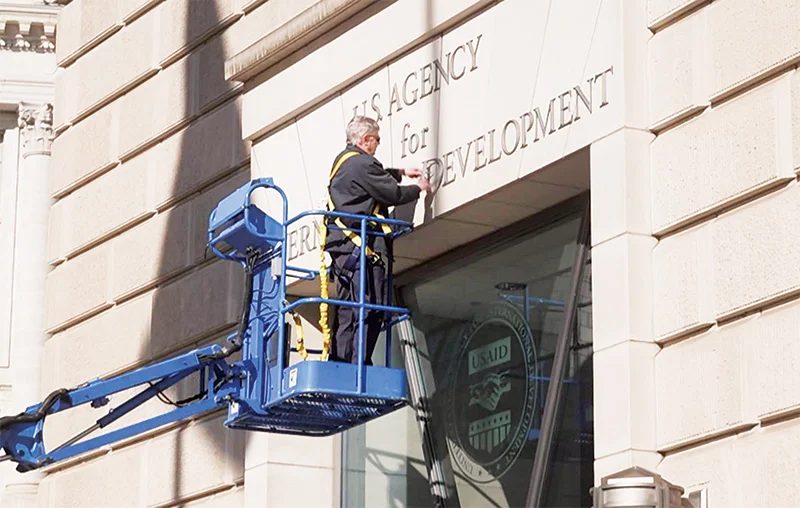
by Jehan Perera
The virtually overnight suspension of the U.S. government’s multibillion dollar foreign aid programme channeled through USAID has been headline news in the U.S. and in other parts of the world where this aid has been very important. In the U.S. itself the suspension of USAID programmes has been accompanied by large scale loss of jobs in the aid sector without due notice. In areas of the world where U.S. aid was playing an important role, such as in mitigating conditions of famine or war, the impact is life threatening to large numbers of hapless people. In Sri Lanka, however, the suspension of U.S. aid has made the headlines for an entirely different reason.
U.S. government authorities have been asserting that the reason for the suspension of the foreign aid programme is due to various reasons, including inefficiency and misuse that goes against the present government’s policy and is not in the U.S. national interest. This has enabled politicians in Sri Lanka who played leading roles in previous governments, but are now under investigation for misdeeds associated with their periods of governance, to divert attention from themselves. These former leaders of government are alleging that they were forced out of office prematurely due to the machination of NGOs that had been funded by USAID and not because of the misgovernance and corruption they were accused of.
In the early months of 2022, hundreds of thousands of people poured out onto the streets of Sri Lanka in all parts of the country demanding the exit of the then government. The Aragalaya protests became an unstoppable movement due the unprecedented economic hardships that the general population was being subjected to at that time. The protestors believed that those in the government had stolen the country’s wealth. The onset of economic bankruptcy meant that the government did not have foreign exchange (dollars) to pay for essential imports, including fuel, food and medicine. People died of exhaustion after waiting hours and even days in queues for petrol and in hospitals due to lack of medicine.
PROBING NGOS
There have been demands by some of the former government leaders who are currently under investigation that USAID funding to Sri Lanka should be probed. The new NPP government has responded to this demand by delegating the task to the government’s National NGO Secretariat. This is the state institution that is tasked with collecting information from the NGOs registered with it about their quantum and sources of funding and what they do with it for the betterment of the people. Public Security Minister Ananda Wijepala has said he would deal with allegations over USAID funding in Sri Lanka, and for that he had sought a report from the NGO Secretariat which is operating under his Ministry.
Most donor agencies operating in Sri Lanka, including USAID, have rigorous processes which they follow in disbursing funds to NGOs. Usually, the donor agency will issue a call for proposals which specify their areas of interest. NGOs have to compete to obtain these funds, stating what they will do with it in considerable detail, and the impact it will have. Once the grant is awarded, the NGOs are required to submit regular reports of work they have done. The donor agencies generally insist that reputed audit firms, preferably with international reputations, perform regular annual or even six-monthly audits of funds provided. They may even send independent external monitors to evaluate the impact of the projects they have supported.
The value of work done by NGOs is that they often take on unpopular and difficult tasks that do not have mass appeal but are essential for a more just and inclusive society. Mahatma Gandhi who started the Sarvodaya (meaning, the wellbeing of all) Movement in India was inspired by the English philosopher John Ruskin who wrote in 1860 that a good society was one that would care for the very last member in it. The ideal that many NGOs strive for, whether in child care, sanitation, economic development or peacebuilding is that everyone is included and no one is excluded from society’s protection, in which the government necessarily plays a lead role.
SELF-INTEREST
Ironically, those who now demand that USAID funds and those organisations that obtained such funds be investigated were themselves in government when USAID was providing such funds. The National NGO Secretariat was in existence doing its work of monitoring the activities of NGOs then. Donor agencies, such as USAID, have stringent policies that prevent funds they provide being used for partisan political purposes. This accounts for the fact that when NGOs invite politicians to attend their events, they make it a point to invite those from both the government and opposition, so that their work is not seen as being narrowly politically partisan.
The present situation is a very difficult one for NGOs in Sri Lanka and worldwide. USAID was the biggest donor agency by far, and the sudden suspension of its funds has meant that many NGOs have had to retrench staff, stop much of their work and some have even closed down. It appears that the international world order is becoming more openly based on self-interest, where national interests take precedence over global interests, and the interests of the wealthy segments of society take precedence over the interests of the people in general. This is not a healthy situation for human beings or for civilisation as the founders of the world religions knew with their consistent message that the interests of others, of the neighbour, of all living beings be prioritised.
In 1968, when the liberal ideas of universal rights were more dominant in the international system, Garrett Hardin, an evolutionary biologist, wrote a paper called “The Tragedy of the Commons”. Hardin used an example of sheep grazing land when describing the adverse effects of overpopulation. He referred to a situation where individuals, acting in their own self-interest, overexploit a shared resource, like a pasture or fishery, leading to its depletion and eventual destruction, even though it is detrimental to everyone in the long run; essentially, the freedom to use a common resource without regulation can lead to its ruin for all users. The world appears to be heading in that direction. In these circumstances, the work of those, who seek the wellbeing of all, needs to be strengthened and not undermined.
Features
Dealing with sexual-and gender-based violence in universities
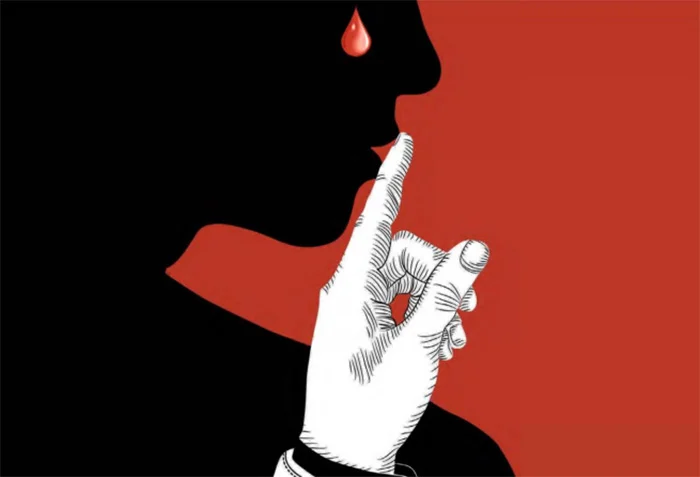
Out of the Shadows:
By Nicola Perera
 Despite policy interventions at the University Grants Commission (UGC), university, and faculty levels, sexual- and gender-based violence (SGBV) is so entrenched in the system that victim-survivors seeking justice are more likely to experience concerted pushback than the empathetic solidarity of their peers. Colleagues and friends will often close ranks, rallying to protect the accused under misguided notions of safeguarding the reputation of, not merely the assumed perpetrator, but the institution. While gender and sexual inequalities, inflected by class, ethnicity, religion, region, and other characteristics, shape the identities of the perpetrator and victim and the situation of abuse, the hyper-hierarchised nature of the university space itself enables and conceals such violence. It’s also important to note that women are not the exclusive victims of violence; boys and men are caught in violent dynamics, too.
Despite policy interventions at the University Grants Commission (UGC), university, and faculty levels, sexual- and gender-based violence (SGBV) is so entrenched in the system that victim-survivors seeking justice are more likely to experience concerted pushback than the empathetic solidarity of their peers. Colleagues and friends will often close ranks, rallying to protect the accused under misguided notions of safeguarding the reputation of, not merely the assumed perpetrator, but the institution. While gender and sexual inequalities, inflected by class, ethnicity, religion, region, and other characteristics, shape the identities of the perpetrator and victim and the situation of abuse, the hyper-hierarchised nature of the university space itself enables and conceals such violence. It’s also important to note that women are not the exclusive victims of violence; boys and men are caught in violent dynamics, too.
Similar to intimate partner violence in the private confines of home and family, violence attributed to the sex and gender of abusers and victims in our universities goes heavily underreported. The numerous power imbalances structuring the university – between staff and students; academic staff versus non-academic staff; senior academic professionals as opposed to junior academics; or, senior students in contrast to younger students – also prevent survivors from seeking redress for fear of professional and personal repercussions. Research by the UGC in 2015 in collaboration with the Federation of University Teachers’ Associations (FUTA) and CARE International Sri Lanka, and more recently with UNICEF in 2021, revealed discomfiting truths about the university as places of work and education. In naming oneself as a survivor-victim, even within whatever degree of confidentiality that current grievance mechanisms offer, the individual may also represent (to some members of the university community, if not to the establishment itself) a threat to the system.
Conversely, an accused is liable to not just disciplinary action by their university-employer, but to criminal prosecution by the state. Via the Penal Code, the Prevention of Domestic Violence Act (2005), etc., the law recognises SGBV as an offence that can take place across many contexts in the private and public spheres. (The criminalisation of SGBV is in line with state commitments to ensuring the existence, safety, and dignity of women and girls under a host of international agreements, such as the United Nations Convention on the Elimination of Discrimination Against Women, Vienna Declaration on the Elimination of Violence Against Women, the Sustainable Development Goals, International Labour Organisation conventions regarding non-discrimination in employment, etc.). Specific to the university, the so-called anti-ragging act (the Prohibition of Ragging and Other Forms of Violence in Education Institutes Act of 1998, in addition to UGC circular no. 919 of 2010, etc.) deems SGBV as a punishable offence. The rag is one site where SGBV often finds fluent articulation, but it is hardly the only one: this is not a problem with just our students.
As the apex body governing higher education in the country, the UGC has not remained insensible to the fact that SGBV harms the lives, rights, and work of students, staff, (and other parties) in university spaces. The Centre for Gender Equity/Equality sits at the UGC level, along with gender cells/committees in individual universities. Universities and faculties have elaborated their own policies and bylaws to address sexual- or gender-based harassment and sexual violence. Although variously articulated, these policies touch on issues of consent; discrimination against a person, or creation of a hostile environment, on the basis of their gender or sexuality; the spectrum of actions that may constitute harassment/violence (including through the use of technology); coerced or voluntary sexual favours as a quid-pro-quo for academic or professional benefits; procedures for making and investigating SGBV complaints; protection of witnesses to an investigation; the irrelevance of the complainant’s sexual history to the complaint at hand. And here begins the inevitable tale of distance between policy, practice, and effect.
Different faculties of the same university may or may not include SGBV awareness/ training in the annual orientation for new students. The faculty’s SGBV policy may or may not appear in all three languages and Braille in student handbooks. Staff Development Centres training new recruits in outcome-based education and intended learning outcomes may or may not look at (or even realise) the politics of education, nor include an SGBV component in its Human Resources modules. Universities may or may not dedicate increasingly stretched resources to training workshops on SGBV for staff, or cover everyone from academics, to administrative staff, to the marshals, to maintenance staff, to hostel wardens.
Workshops may in any case only draw a core of participants, mostly young, mostly women. Instead, groups of male academics (aided sometimes by women colleagues) will actively organise against any gender policy which they construe as a personal affront to their professional stature. Instead, the outspoken women academic is painted as a troublemaker. Existing policy fails to address such discourse, and other normalised microaggressions and subtle harassment which create a difficult environment for gender and sexual minorities. In fact, the implementation of gender policy at all may rest on the critical presence of an individual (inevitably a woman) in a position of power. Gender equality in the university at any point appears to rest on the convictions and labour of a handful of (mostly women) staff or officials.
The effect is the tediously heteropatriarchal spaces that staff and students inhabit, spaces which whether we acknowledge them as such or not, are imbued with the potential, the threat of violence for those on the margins. The effect, as Ramya Kumar writing earlier in this column states, is the inability of our LGBTQI students and staff to be their authentic selves, except to a few confidantes. Since the absence/rarity of SGBV complaints is no evidence that the phenomenon does not exist, perhaps a truer indication of how gender-sensitised our institutions and personnel are, comes back again to the reception of such complaints. Thus, a woman accuser is frequently portrayed as the archetypal scorned woman: abuse is rewritten not just as consent, but a premeditated transaction of sexual relations in exchange for better grades, a secured promotion, and so on. A situation of abuse becomes inscribed as one of seduction, where the accuser basically changes their tune and cries harassment or rape when the expected gains fail to materialise. Especially with the global backlash to MeToo, society is preoccupied with the ‘false accusation,’ even though there is plenty of evidence that few incidents of SGBV are reported, and fewer still are successfully prosecuted. These misogynist tropes of women and women’s sexuality matter in relation to SGBV in university, because Faculty Boards, investigative committees, Senates, and Councils will be as equally susceptible to them as any citizen or juror in a court of law. They matter in placing the burden of documenting abuse/harassment as it takes place on the victim-survivor, to accumulate evidence that will pass muster before a ‘neutral,’ ‘objective’ observer.
At the end of the day, when appointments to gender committees may be handpicked to not rock the boat, or any university Council may dismiss a proven case of SGBV on a technicality, the strongest policies, the most robust mechanisms and procedures are rendered ineffective, unless those who hold power in everyday dealings with students and persons in subordinate positions at the university also change.
(Nicola Perera teaches English as a second language at the University of Colombo.)
Kuppi is a politics and pedagogy happening on the margins of the lecture hall that parodies, subverts, and simultaneously reaffirms social hierarchies.
-
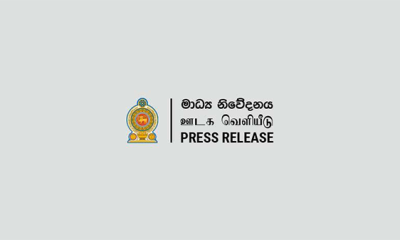
 News7 days ago
News7 days agoOracle Corporation pledges support for Sri Lanka’s digitalization
-

 Sports4 days ago
Sports4 days agoRemarkable turnaround for Sri Lanka’s ODI team
-

 Editorial7 days ago
Editorial7 days agoGroping in the dark
-
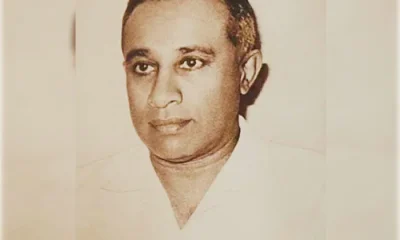
 Opinion7 days ago
Opinion7 days agoShortage of medicines: Senaka Bibile Policy is the solution
-

 Opinion7 days ago
Opinion7 days agoThe passing of Sarjana Karunakaran
-
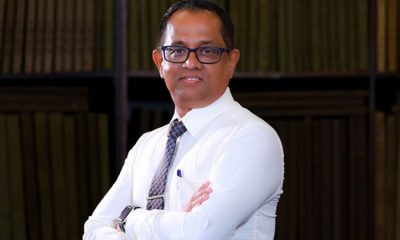
 News5 days ago
News5 days agoSpeaker agrees to probe allegations of ‘unethical funding’ by USAID
-
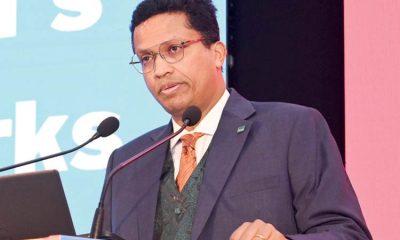
 Business4 days ago
Business4 days agoUN Global Compact Network Sri Lanka: Empowering Businesses to Lead Sustainability in 2025 & Beyond
-
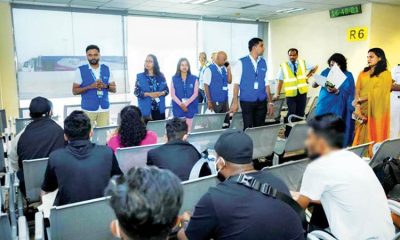
 Features4 days ago
Features4 days agoScammed and Stranded: The Dark Side of Sri Lanka’s Migration Industry











